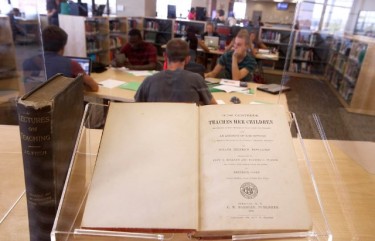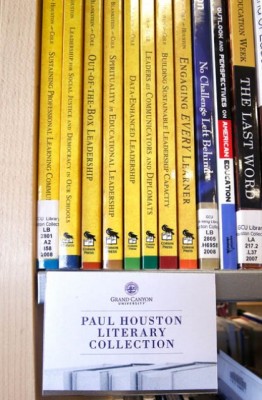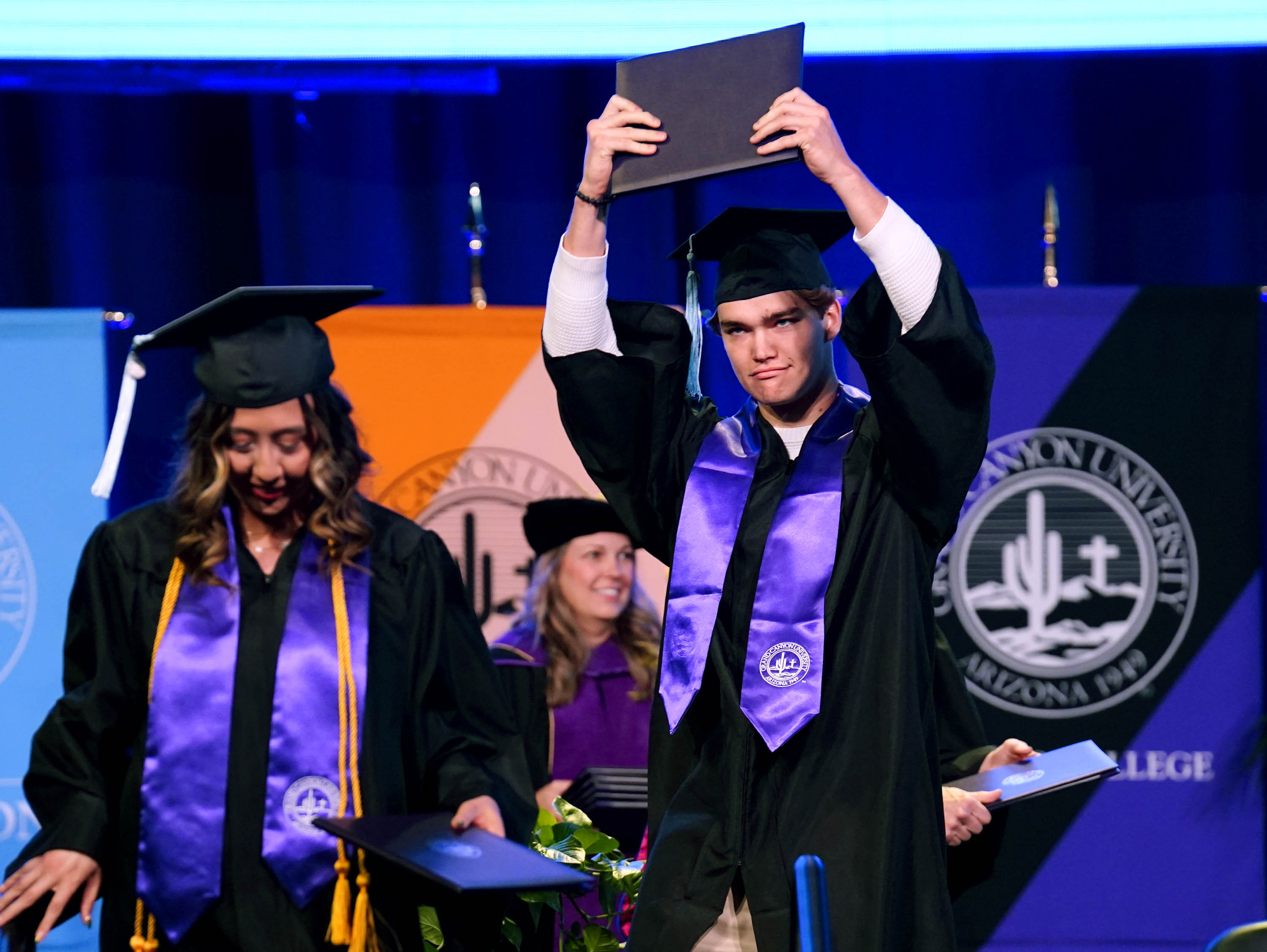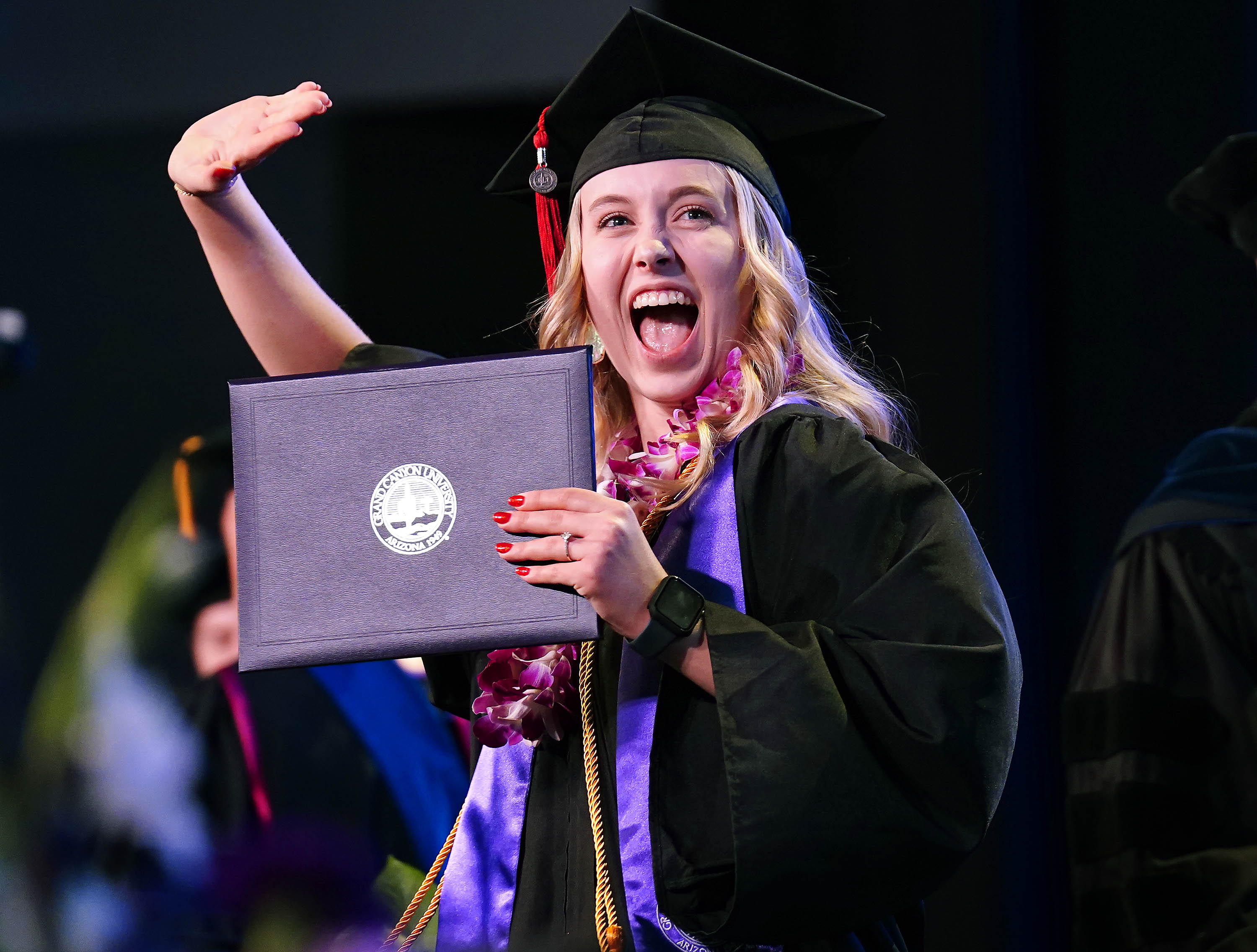Story by Janie Magruder
Photos by Darryl Webb
GCU News Bureau
A collection of books belonging to Dr. Paul D. Houston, one of the country’s foremost education experts and a former chief of the American Association of School Administrators, has found a permanent home in Grand Canyon University’s Library.
The exhibit of 300 books, along with an additional 450 print and digital titles from WestEd, a renowned research agency, will be dedicated as the library’s first permanent donation on Monday, Sept. 15.
Houston’s collection, which includes some tomes more than a century old and others autographed by American presidents, is a blessing for GCU and its faculty, alumni and students and educators at its participant schools who all will have access to it, said Dr. Tacy Ashby, senior vice president of the University’s Strategic Educational Alliances (SEA).
"Paul Houston’s years of service have made an enormous contribution to American education," Ashby said. "The donated collection is a reflection of his vast local, national and international experience and expertise as well as his practical and relevant wealth of knowledge. His influence and written work have helped to shape national educational policy and have impacted many school leaders and entire school districts.
"It is a privilege and honor that the Houston collection and accompanying WestEd resources are finding a home in the GCU Library. The combined collections span educational theory to action and research to practice," said Ashby, who serves with Houston and Dr. Beverly Hurley, SEA’s Director of Academic Alliances, on WestEd’s board of directors.
Houston decided to donate part of his large personal collection after his first visit to GCU last year. He toured campus and a few classrooms and said he was reminded of a panel he’d been on years ago that had addressed members of the U.S. Senate on the No Child Left Behind Act.
“I thought it would be the disaster it became, and I told them they didn't have to do all that testing.” Houston said. “If they wanted to learn how good a school was, all they needed to do was go into some classrooms to see which way the kids were leaning. If they were leaning forward it was a classroom that was doing meaningful and engaging work. If they were leaning back, then they were disinterested and probably not learning much.”
At GCU, he noticed, “Everyone seems to lean forward with excitement and enthusiasm.”
Houston offered the collection to Ashby, who with Hurley approached WestEd on the possibility of combining his books with some of that organization’s cutting-edge research materials for educators. WestEd agreed and sent to GCU dozens of books and manuals in addition to hundreds of PDFs, webinars, streaming media, CD-ROMs and a few VHS tapes.
Library director Nita Mailander said the materials represent a fascinating look at how teaching has changed over the past century and include information on the best pedagogy, theories and applications available in the world of education.
“We have received an incredible scholarly collection,” Mailander said. “Much of WestEd’s materials are their own original content, knowledge they have published or authored or been involved with. And Dr. Houston’s books are an eclectic mix of literally old-school teaching principles, information through the decades of the 20th century on educational administration and psychology, as well as cutting-edge tools for the modern school teacher and administrator. The collection paints a vivid picture of how teaching and educational leadership has changed and continues to do so.”
Houston is a former teacher and school administrator, was a schools superintendent in Tucson, where he currently resides, Princeton, N.J., and Riverside, Calif., and has taught at Harvard University and Princeton University, among others. He was executive director of the American Association of School Administrators from 1994 to 2008 and has written more than 150 articles published in professional journals.
But Houston wasn’t always a reader. As a boy growing up in West Virginia, he attended a rural school and got lost in the shuffle of too many students and not enough individualized attention. Finally, though, his third-grade teacher gave him a stack of books, insisted that he read them, and “Somewhere along the way, the light went on and I was captured by the world.”
During his career, Houston also was given copies of books signed by, among others, President Barack Obama and President Bill Clinton and billionaire Bill Gates. Houston’s collection evolved through the years, with more recent titles suggesting the use of meditation and martial arts to become a more effective leader.
“The longer I stayed in the business (educational administration), the more eclectic I got in my reading,” he said.
Houston has uncovered many book treasures at garage sales, perhaps most notably “Mistakes in Teaching,” published in 1898 by James L. Hughes, an inspector of public schools in Toronto. Its drab olive cloth cover belies what’s inside: humorous classroom dos and don’ts for new teachers with a long-ago reader’s handwritten notes (in pencil, of course) in the margins.
Among the dos: Teach students to go up and down the stairs, keep a book in your left hand when reading to students, and be judicious with corporal punishment, although, “(Whipping) is better for boys than confinement in jail.” Don’ts: Lay your head on your desk, lean or “annoy parents unnecessarily.”
The library is framing a card that was wedged in the pages of the old book. It instructs the holder to present it to the Eagleton School of Business before Oct. 1, 1909, to receive $1 toward a shorthand or bookkeeping scholarship.
Houston also collected these titles through the ages: “How Gertrude Teaches Her Children” by Johann Heinrich Pestalozzi (1898), “Primary Arithmetic” by David Eugene Smith (1904), “Educational Psychology” by Lee J. Cronbach (1963), “The Hurried Child” by David Elkind (1981), “Fist Stick Knife Gun” by Geoffrey Canada (1995), “Real Boys: Rescuing Our Sons from the Myths of Boyhood” by Dr. William Pollack (1998), and “Failure is not an Option” by Alan M. Blankstein (2013).
The WestEd collection includes CD-ROMs such as “Dr. Art Does Science,” fat how-to binders on teaching students to read history and science, and manuals on topics from diversity in the classroom and English learners with learning disabilities to juvenile crime and justice and technology in the K-8 classroom. There are nearly 20 books that teach math concepts such as perimeter, angles, graphing and measuring using the traditional wisdom and practices of the Yup’ik Eskimo people of southwestern Alaska.
From start – “For Our Babies: Ending the Invisible Neglect of America’s Infants” – to finish – “Minding the Gap: Why Integrating High School with College Makes Sense and How to Do it” – the WestEd collection is worth poring over just for fun. As are the Houston books. Priceless, as they say.
Contact Janie Magruder at 602-639-8018 or [email protected].






